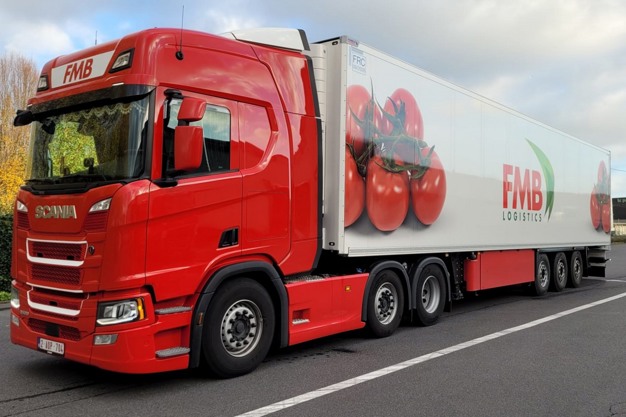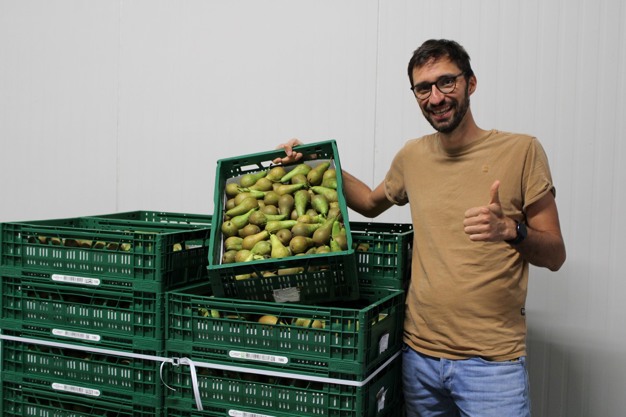After a challenging period, the greenhouse vegetable market is starting to regain momentum, according to Jonathan Vandesande from FMB. "We do a lot of business in Germany, and in Bavaria, for instance, people have been on holiday until the first week of September. Now they're all coming back, which is generating some demand. However, supply is quickly decreasing," says the trader at the Flemish exporter, which will celebrate its 100th anniversary next year.

"Until August, everyone had their own vegetable gardens, and small growers were supplying their own tomatoes. Now that it's getting a bit colder, that's coming to an end," Jonathan explains. "This has led to an increase in demand. The summer has been quite slow, but as local German products gradually disappear, we're seeing a shift again. However, the supply of greenhouse vegetables is rapidly declining."
"This applies to all varieties," he notes. "There's a noticeable shortage of cucumbers everywhere, and pepper supplies are also gradually decreasing. Over the past two weeks, there were still some Moldovan and Polish products available, but those are also dwindling. We're seeing a similar situation with tomatoes, where Polish supplies are declining as well. Everyone is turning their attention to Spain, but they've experienced heatwaves in recent weeks, so we're hearing that the quality there isn't very good either."
"For instance, they start with Spanish cucumbers before peppers and tomatoes come onto the market. While these cucumbers may be cheap, they can't sell them after just two days. For Belgian growers, this has been an excellent season, as prices have remained high all summer. This trend is likely to continue until good-quality Spanish cucumbers arrive. I expect supply to tighten rather than increase soon, which means prices will likely stay elevated for a while."
Worst tomato season in years
The current surge in tomato prices is certainly welcome, especially given how poor the market has been until now. "Since the end of August, the market has been quite challenging, but before that, it was perhaps the worst summer season I've seen in recent years. Prices haven't been this low since the Covid pandemic. It's surprising because I thought we would never see such prices again," Jonathan explains.

"Indeed, for the first four years after the pandemic, we primarily experienced shortages. This was largely due to the ToBRFV virus and, additionally, the gas crisis. As a result, less was grown, and what was cultivated was affected by the virus. It may sound odd, but in hindsight, that virus might have been a blessing. When supply is limited, growers can achieve higher overall yields, so they were better off during that time."
"This is why I, along with many others, believed we would never see those incredibly low prices of 15 to 20 cents per kilo for tomatoes again, especially considering the inflation that has sharply increased costs for growers," the trader explained. "Yet, it seems that such prices are indeed possible. Growers have naturally produced more because they've been receiving good prices in recent years. Additionally, there are resistant varieties available, and energy prices are low, prompting everyone to increase production. This has led to significantly higher volumes, but unfortunately, demand—especially in Germany—has not kept pace."
Lower purchasing power is a significant factor in this situation. "We've heard from customers that purchasing power has decreased in German-speaking countries, which is our largest market. Germany, in particular, has the highest savings rate relative to gross income. In the gastronomy sector, spending has declined because prices have become too high. Restaurants are facing exponential increases in staff and rent costs, which they have to pass on to consumers, leading to a drop in sales. Overall, the mood is quite subdued."
Apples in revival
Jonathan is already looking ahead to the winter season, particularly focusing on top fruit and winter vegetables for FMB. "Right now, the top fruit market is more promising than that of greenhouse vegetables. We will continue with greenhouse vegetables until the end of October or mid-November, albeit with smaller volumes. After that, we enter into competition with Spain, which is a typical scenario every year. At that point, we will shift our focus to top fruit and winter vegetables."

"We're seeing that apples are performing well in terms of pricing," he continues. "Until three or four years ago, growers struggled to sell their apples, often ending up with excess at the end of the season that had to be sent to processors. Now, however, they are securing commitments for the season before the harvest, which is a positive development. Additionally, many apple trees have been uprooted in recent years due to overproduction, so we can now anticipate a healthier market."
Jonathan argues that this trend also applies to pears. "We can achieve good prices there as well. However, similar to apples, most of the pears available are bigger sizes. There are hardly any smaller pears, so we've noticed that even this week, there are very few price differences among the bigger ones. This situation isn't necessarily favorable for us, as the German market primarily demands smaller pears. The bigger sizes are being sent to Eastern Bloc countries, France, or remain in the domestic market. Nevertheless, we expect to keep ourselves busy during the winter months," Jonathan concludes.
For more information:
Jonathan Vandesande
Frans Michiels & Zn (FMB )
Kempenarestraat 50A - Bus 3
2860 Sint-Katelijne-Waver, Belgium
Tel +32 15 560600
[email protected]
www.fmb.be










